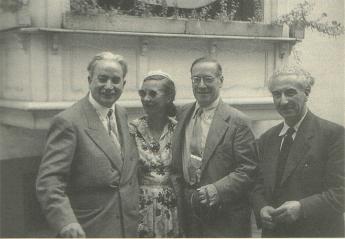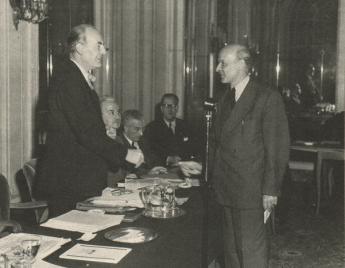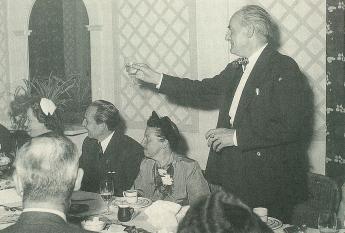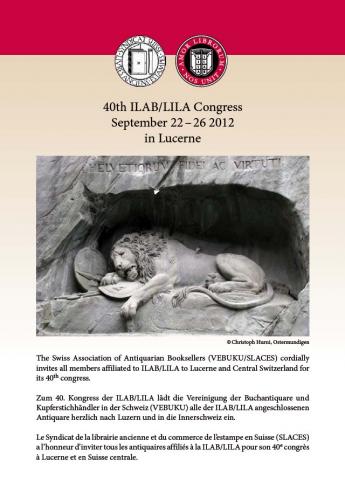Antiquarian Booksellers' Association
1951 - Some Impressions of the 5th ILAB Congress in Brussels

This is the charm of every ILAB Congress. What we call a global network today, has been ILAB’s nature from the beginning. You meet old friends and colleagues from all over the world and have the opportunity to establish new friendships and good business relations. This was true for the 5th ILAB Congress in Brussels in 1951, and it will be the same in Switzerland in 2012.
Before the conference took place in Brussels in 1951, the work on the first ILAB Directory had finally been done. The design for the emblem had been chosen, and the finances were balanced. The most important item on the agenda was the election of a new member association.
The German Antiquarian Booksellers’ Association (VDA) had been founded in 1949, now their President Helmuth Domizlaff had applied for membership on behalf of the VDA. There had been “some diplomatic lobbying” behind the scenes before the congress. A German application at that time, shortly after the War, could have been controversial. But the Brussels conference went smoothly:
“Waiting in an anteroom while the German application for membership was debated, Helmuth Domizlaff need not have worried (he had been shaking with nervousness, he told us later), for Percy (H. Muir) and André (Poursin) had seen to it that the ground was well prepared before a vote was taken. The result was eleven out of twelve associations in favour.”
(Barbara Kaye Muir)
From the ABA Newsletter 18
To many of the British delegates their first impression of Brussels must have been of rain. We had been told it was one of the wettest places in Europe, and this reputation was borne out by the torrential rain on the Sunday before the Conference began. That afternoon, in company with other delegates and their wives, we watched from the upper windows of a bookseller’s gallery, a traditional procession assembling in the Grande Place. The procession consisted of men, women and children dressed in national costume, accompanying their wagons or lorries which were piled high with country produce. Musical bands and marching men and women were interspersed among the vehicles, and these were followed by traditional giants, huge figures in national and historical costume, varying in height from ten to twenty feet. This colourful scene, though marred by incessant rain, was an appropriate start for the festive side of the fifth international Conference.
Mercifully, the rain stopped during the night on Monday, the first day of the Conference was fine. It is very pleasant on the first day to look around to see who has come from the other national associations; one looks for friends one met in Paris, in London, in Copenhagen, or if per chance one were among the original delegates, way back in Amsterdam.
Wednesday was given up to Bruges. We left Brussels at 9 am and returned about midnight. After lunch we explored the canals and appreciated the beauty of the building lining their banks. One charming eighteenth century house was much admired because all its windows were of pure crystal and reflected in the changing light colours of mauve, deepening and then fading to dove grey and white. Navigating the canals called for considerable alertness, because many of the bridges were so low that the occupants had to crouch at the bottom of the boats to avoid decapitation. It was the only occasion during the week that the President of the League came near to losing his head.
Reboarding our coaches we were driven to the farm of Mr. van Damme, a Belgian book collector, who had most generously staged a sixteenth century fête set in the appropriate surroundings of his farm. Not only were we served with traditional Flemish food and drink, but we were also regaled with traditional Flemish songs sung by members of the Ghent Opera House. The singers, dressed in costume, had previously taken the part of serving men and maids. The effect was that we had wandered into the set of a historical film in glorious Technicolor. The party ended enthusiastically: it had obviously been a tremendous success with every one – organisers, players and guests. We left as the evening began to draw in and drove back to Bruges to see the city illuminations.
On the afternoon of the following day we went to Antwerp. We were conducted over the famous Plantin-Moretus Museum (the home for centuries of the famous printing house). We were fortunate in having for our guide the Vice-President of the Belgian Association, William Marsily. He pointed out, in fluent English, the more important exhibits. His charming asides were refreshing and (what is rare among guides) he knew when to stop. One vivid impression of the day was an all too brief view of Malines Cathedral from the coaches as we drove through the town. The magnificent tower appeared almost to float in the sky as we looked up at it through the open roof of our coach.
The week ended as the Conference week is expected to end with a farewell supper. And what an evening it was! It was the crowning point of Belgian hospitality, with lavish good taste in food and wine, and a charming gift to each lady of a small white butterfly of Brussels lace. Then there were the customary speeches, each national president in turn speaking in English or French but adding a short message in his own language.
A notable speech was made by the imperturbable President of the League, Percy Muir. (Here it may be recorded that throughout the week he had been making brilliant speeches, and the British delegation felt proud that a member of their Association had so distinguished himself, not only at the social events but by the way he had presided at the business meetings.) An eloquent speech by Monsieur Blaizot, the French President, was much appreciated, but perhaps the speech of the evening was that of Madame Tulkens, who throughout the week had been the perfect hostess. In a most moving speech in French and English she appealed to us all to remember a task dear to the League’s heart: that of receiving children from different countries into our homes and allowing our children to go in exchange. She said that it was through our children that our present friendship must continue, because they were our future.
At the end of dinner, the President of Honour William Kundig, presented a piece of silver to Monsieur and Madame Tulkens, a joint gift from all the associations. Amid clamorous applause, Denise Tulkens stood up and after kissing the President and the President of Honour and their wives, she kissed her hands again and again to the company.
Then came the dancing, which lasted until 3 am. Some of us were tired after such a week, but one remembers Willy Elly dancing while men nearly half his age sat back and enviously admired his energy. The dance ended with Auld Lange Syne – a swinging circle of dancers singing the words or chanting to the tune. It was encored, and then the band broke up. But the party lingered on, small groups gathering to thank, congratulate and say goodbye to Monsieur and Madame Tulkens, and to express the hope of meeting again next year.
40th ILAB Congress and 24th ILAB International Antiquarian Book Fair
Find out more about the upcoming ILAB Congress in Switzerland in September 2012.
Download the Congress Brochure and click here for more information about the Congress and the Book Fair!
>>> Official website www.vebuku.ch
ILAB Directory 2013/2014
The new ILAB Directory will be published at the beginning of 2013. If you wish to advertize in the Directory, please contact the ILAB Executive Secretary.



